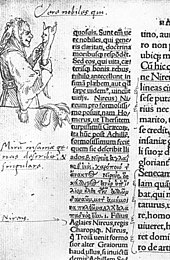Erasmus 的中文傳記(譯)數本,都是名家的。
****
The story of Erasmus, one of the greatest scholars of the northern European Renaissance, gives hope to those who resist competing bigotries

ECONOMIST.COM
Erasmus’s teachings are still pertinent today
Citizen of the world
In Praise of Folly, also translated as The Praise of Folly (Latin: Stultitiae Laus or Moriae Encomium; Greek title: Μωρίας ἐγκώμιον (Morias egkomion); Dutch title: Lof der Zotheid), is an essay written in Latin in 1509 by Desiderius Erasmus of Rotterdam and first printed in June 1511. Inspired by previous works of the Italian humanist Faustino Perisauli De Triumpho Stultitiae, it is a satirical attack on superstitions and other traditions of European society as well as on the Western Church.[1]
Erasmus revised and extended his work, which was originally written in the space of a week while sojourning with Sir Thomas More at More's house in Bucklersbury in the City of London.[2] The title Moriae Encomium had a punning second meaning as In Praise of More. In Praise of Folly is considered one of the most notable works of the Renaissance and played an important role in the beginnings of the Protestant Reformation.[3]
Content[edit]
In Praise of Folly starts off with a satirical learned encomium, in which Folly praises herself, after the manner of the Greek satirist Lucian, whose work Erasmus and Sir Thomas More had recently translated into Latin, a piece of virtuoso foolery; it then takes a darker tone in a series of orations, as Folly praises self-deception and madness and moves to a satirical examination of pious but superstitious abuses of Catholic doctrine and corrupt practices in parts of the Roman Catholic Church—to which Erasmus was ever faithful—and the folly of pedants. Erasmus had recently returned disappointed from Rome, where he had turned down offers of advancement in the curia, and Folly increasingly takes on Erasmus' own chastising voice. The essay ends with a straightforward statement of Christian ideal: "No Man is wise at all Times, or is without his blind Side."
Erasmus was a good friend of More, with whom he shared a taste for dry humor and other intellectual pursuits. The title "Morias Encomium" can also be read as meaning "In praise of More". The double or triple meanings go on throughout the text.
The essay is filled with classical allusions delivered in a style typical of the learned humanists of the Renaissance. Folly parades as a goddess, offspring of Plutus, the god of wealth and a nymph, Freshness. She was nursed by two other nymphs, Inebriation and Ignorance. Her faithful companions include Philautia (self-love), Kolakia (flattery), Lethe (forgetfulness), Misoponia (laziness), Hedone (pleasure), Anoia (dementia), Tryphe (wantonness), and two gods, Komos (intemperance) and Nigretos Hypnos (heavy sleep). Folly praises herself endlessly, arguing that life would be dull and distasteful without her. Of earthly existence, Folly pompously states, "you'll find nothing frolic or fortunate that it owes not to me."
***
伊拉斯謨. 愚人頌. 許崇信、李寅 譯. 南京: 譯林出版社. 一月 2010.
***
除了寫導讀,我也替「新潮文庫」翻譯,用的是「李映萩」這個別號,大多翻譯西方著作,像是費迪曼的《一生的讀書計畫》、伊拉思摩斯的《愚神禮讚》、莫洛亞的《文學欣賞的樂趣》等,小說也翻了不少。記憶中有幾本書比較特別,像《德國文學入門》是張清吉拿給我很多德國文學的資料,我全部讀完後替他整理編寫出來的。還有一本《法國文學與作家》,前半部是別人寫的,十八、十九世紀以後的部分則由我補寫,只不過出版出來時,書裡書外都沒有放我的名字。李永熾憶張清吉


No comments:
Post a Comment